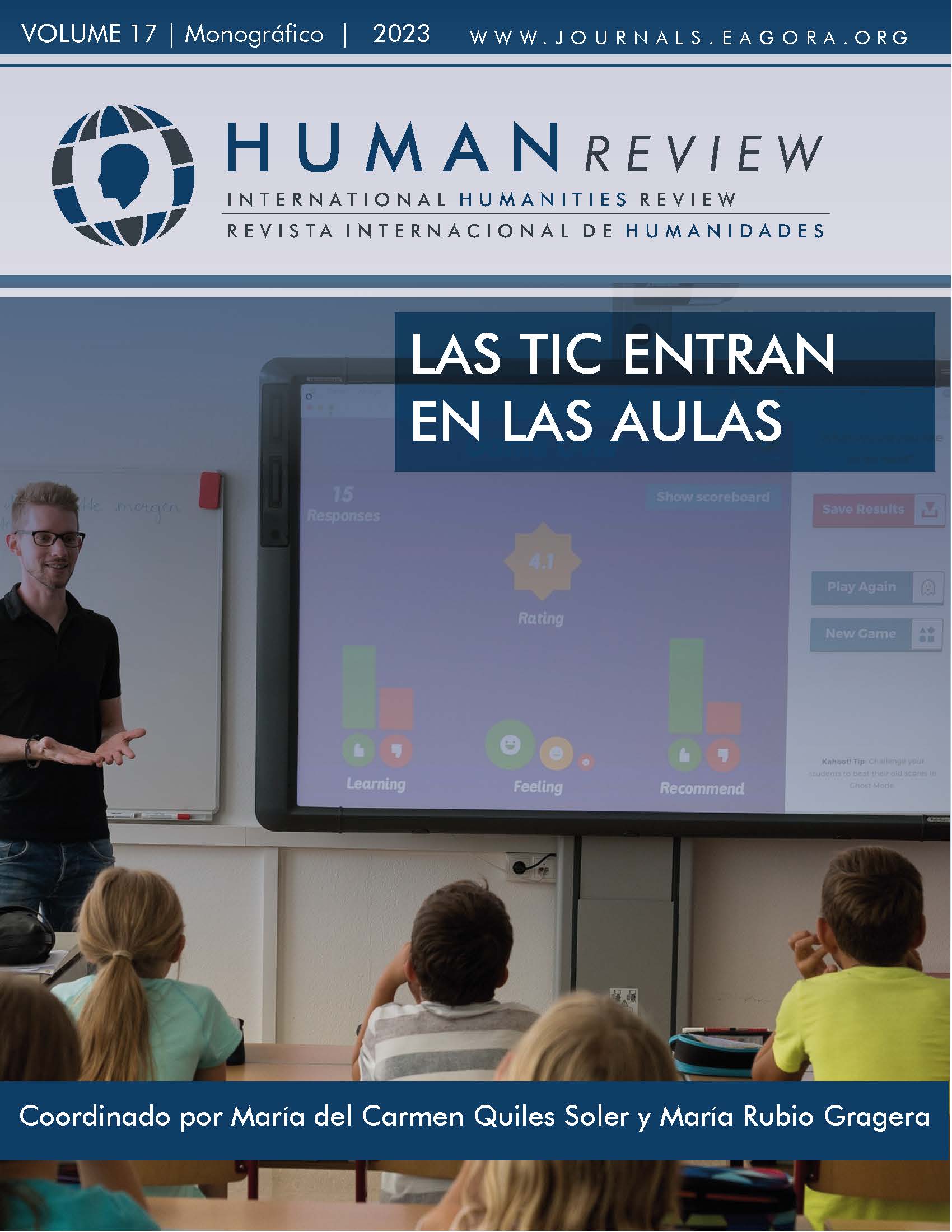The impact of mobile applications for English Learning
The employability of UABC graduates in the northern border of Baja California, México
DOI:
https://doi.org/10.37467/revhuman.v12.4748Keywords:
Employability, English, Northern frontier, Competitiveness, Companies, Employers, AdvancedAbstract
This study aims to analyze the relationship that exists between learning English, employers and the ways in which the teaching of English and language learning is being addressed in the state of Baja California. This research focused on meeting the following objectives: 1. Identify the main professional skils required by the business sector in Baja California from its prospective employees in terms of hiring and job advancement. 2. Analyze the type of communication skills required by the business sector in terms of English proficiency of its graduates in communicative, written and oral competence and the new forms of learning that are available through technology.
References
Becerril I., (abril, 27, 2015). En México sólo el 5% de la población habla inglés: IMCO. El Financiero. https://www.elfinanciero.com.mx/economia/en-mexico-solo-de-la-poblacion-habla-ingles-imco/
British Council Education Intelligence. (2014). English levels in Mexico and the impact of government policy.
Cambridge (2022). International Language Standards. Cambridge English Language Assessment. https://www.cambridgeenglish.org/exams-and-tests/cefr/
Castillo B., Strahm E., y Canese V. (2020). Mobile apps for teaching and learning English as a foreign language to teenagers and adults. Revista multilingue de Lengua, Sociedad y Educación. Vol.1, no. 2. https://revistascientificas.una.py/index.php/nemityra/issue/view/49
Centro de Investigación en Política Pública. (26 de abril, 2015). Inglés es posible: Propuesta de una agenda nacional. https://imco.org.mx/ingles-es-posible-propuesta-de-una-agenda-nacional/
Domínguez J., Silva E, Castorena P., Barrera M., Ramírez G., (2017). Investigación sobre las oportunidades de empleo para los profesionistas recién egresados utilizando BSC. Revista Iberoamericana para la Investigación y el Desarrollo Educativo. Vol. 8, Núm. 1. http://www.scielo.org.mx/pdf/ride/v8n15/2007-7467-ride-8-15-00116.pdf
Echeverría M., (1994). Aplicaciones computacionales para la enseñanza aprendizaje del español como lengua materna. Revista de Estudios de Adquisición de la Lengua Española REALE. https://ebuah.uah.es/dspace/bitstream/handle/10017/7328/aplicaciones_echeverria_REALE_1994.pdf?sequence=1&isAllowed=y
Education First (2021). El ranking mundial más grande según su dominio del inglés. https://www.ef.com/wwen/epi/
Enciclopedia Multimedia Virtual Interactiva (s.f. ). Economía del Internet. https://www.eumed.net/cursecon/
Encuesta Nacional de Ocupación y Empleo. (2021). Población de 15 años y más de edad https://www.inegi.org.mx/programas/enoe/15ymas/
García Aretio L., (2016). El juego y otros principios pedagógicos. Supervivencia en la educación a distancia Revista Iberoamericana de Educación a Distancia, vol. 19, núm. 2, 2016, pp. 9-23. https://www.redalyc.org/pdf/3314/331445859001.pdf
Graddol, D. (1997). The future of English? London: British Council.
Hernández R., Hernández C., y Baptista P. , (2014). Metodología de la Investigación. Mc. Graw Hill. Interamericana Editores.
Le Boterf, G. (2008) Enfoque por competencias y trayectorias de formación en la universidad. Conferencia en la Universidad de Talca. http://www.slideshare.net/claudiomoreno/conferencia-de-guy-le-boterf-en-la-universidad-de-talca.
Lee, C-Y. & Cherner, T. S. (2015). A comprehensive evaluation rubric for assessing instructional apps. Journal of Information Technology Education: Research, 14, 21-53. http://www.jite.org/documents/Vol14/JITEV14ResearchP021-053Yuan0700.pdf
Lou M., (2008). Effectiveness of vocabulary learning via mobile pone. Journal of Computer assisted learning. https://doi.org/10.1111/j.1365-2729.2008.00289.x
Marín Diaz, V., Morales Díaz, M., & Reche Urbano, E. (2020). Aprendizaje con videojuegos con realidad aumentada en educación primaria. Revista De Ciencias Sociales, 26, 94-112. https://doi.org/10.31876/rcs.v26i0.34116
Méndez El.,( 2016). El idioma inglés y su relevancia en el mercado laboral.
Montaño S., Martínez E., López I., (2019). El fomento del aprendizaje del idioma inglés en las universidades públicas de la región de Baja California. La política lingüística de la UABC. Editorial UABC. México.
Morán, F. E., Morán, F. L., Morán, F. J., & Sánchez, J. A. (2021). Tecnologías digitales en las clases sincrónicas de la modalidad en línea en la Educación Superior. Revista De Ciencias Sociales, 27(3), 317-333. https://doi.org/10.31876/rcs.v27i3.36772
OCDE. (2019 a). Educación Superior en México. Resultados y relevancia para el mercado laboral. https://doi.org/10.1787/a93ed2b7-es
OCDE.(2019b). Skills Strategy 2019. Skills to shape a better future. https://www.oecd.org/skills/OECD-skills-strategy-2019-ES.
Otzen T., y Manterola C. (2017) Técnicas de muestreo sobre una población de estudio. Int. J. Morphol., 35(1):227-232.
Pandey M., y Pandey P. (2014). Better English for Better Employment Opportunities. International Journal of Multidisciplinary Approach and Studies. Volume 01, No.4, July - Aug 2014. file:///C:/Users/Win10/Downloads/10.04.2014%20(1).pdf
Prieto E., (2018). Aplicaciones móviles como herramientas para aprender vocabulario: análisis de las apps más utilizadas. RedELE revista electrónica de didáctica del español lengua extranjera, número 30. https://www.educacionyfp.gob.es/dam/jcr:a8a5165f-e635-4517-82ee-c3b094d54e16/redele-2018-30-elena-aplicaciones-moviles.pdf
Salas I., Murillo F., (2013). Los profesionistas universitarios y el mercado laboral mexicano: convergencias y asimetrías. Scielo, Vol. 42, no.165. http://www.scielo.org.mx/scielo.php?script=sci_arttext&pid=S0185-2760201300010000
Techopedia (2012). Federal Networking Council. https://www.techopedia.com/
Downloads
Published
How to Cite
Issue
Section
License
Those authors who publish in this journal accept the following terms:
- Authors will keep the moral right of the work and they will transfer the commercial rights.
- After 1 year from publication, the work shall thereafter be open access online on our website, but will retain copyright.
- In the event that the authors wish to assign an Creative Commons (CC) license, they may request it by writing to publishing@eagora.org









